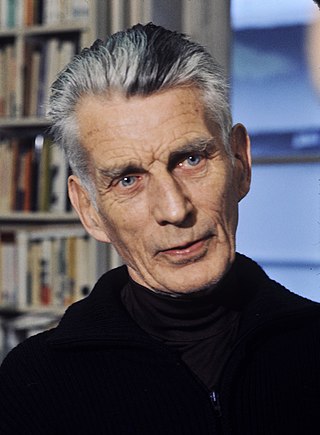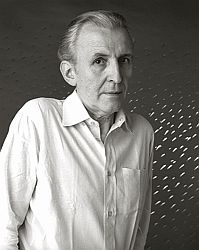
Samuel Barclay Beckett was an Irish novelist, dramatist, short story writer, theatre director, poet, and literary translator. His literary and theatrical work features bleak, impersonal, and tragicomic experiences of life, often coupled with black comedy and nonsense. His work became increasingly minimalist as his career progressed, involving more aesthetic and linguistic experimentation, with techniques of stream of consciousness repetition and self-reference. He is considered one of the last modernist writers, and one of the key figures in what Martin Esslin called the Theatre of the Absurd.
Breath is a unusually short stage work by Samuel Beckett. An altered version was first included in Kenneth Tynan's revue Oh! Calcutta!, at the Eden Theatre in New York City on 16 June 1969. The UK premiere was at the Close Theatre Club in Glasgow in October 1969; this was the first performance of the text as written. The second performance, and the English premiere, was at a benefit held at the Oxford Playhouse on March 8, 1970. "The first accurate publication appeared in Gambit 4.16 (1969): 5–9, with a manuscript facsimile."
Act Without Words I is a short play by Samuel Beckett. It is a mime, Beckett's first. Like many of Beckett's works, the play was originally written in French, being translated into English by Beckett himself. It was written in 1956 following a request from the dancer Deryk Mendel and first performed on 3 April 1957 at the Royal Court Theatre in London. On that occasion it followed a performance of Endgame. The original music to accompany the performance was written by composer John S. Beckett, Samuel's cousin, who would later collaborate with him on the radio play Words and Music.

Krapp's Last Tape is a 1958 one-act play, in English, by Samuel Beckett. With a cast of one man, it was written for Northern Irish actor Patrick Magee and first titled "Magee monologue". It was inspired by Beckett's experience of listening to Magee reading extracts from Molloy and From an Abandoned Work on the BBC Third Programme in December 1957.

The Ginger Man is a novel, first published in Paris in 1955, by J. P. Donleavy. The story is set in Dublin, Ireland, in post-war 1947. Upon its publication, it was initially banned both in Ireland and the United States of America by reason of obscenity. Since then, the book has become a major commercial success, selling over 45 million copies worldwide.
Olympia Press was a Paris-based publisher, launched in 1953 by Maurice Girodias as a rebranded version of the Obelisk Press he inherited from his father Jack Kahane. It published a mix of erotic fiction and avant-garde literary fiction, and is best known for issuing the first printed edition of Vladimir Nabokov's Lolita.
How It Is is a novel by Samuel Beckett first published in French as Comment c'est by Les Editions de Minuit in 1961. The Grove Press published Beckett's English translation in 1964. An advance text of his English translation of the third part appeared in the 1962 issue of the Australian literary journal, Arna.

Maurice Girodias was a French publisher who founded the Olympia Press, specialising in risqué books, censored in Britain and America, that were permitted in France in English-language versions only. It evolved from his father’s Obelisk Press, famous for publishing Henry Miller’s Tropic of Cancer. Girodias published Vladimir Nabokov's Lolita, J. P. Donleavy’s The Ginger Man, and works by Samuel Beckett, William S. Burroughs, John Glassco and Christopher Logue.
What Where is Samuel Beckett's last play produced following a request for a new work for the 1983 Autumn Festival in Graz, Austria. It was written between February and March 1983 initially in French as Quoi où and translated by Beckett himself.
That Time is a one-act play by Samuel Beckett, written in English between 8 June 1974 and August 1975. The play was specially written for actor Patrick Magee, who delivered its first performance on the occasion of Beckett's seventieth birthday celebration, at London's Royal Court Theatre on 20 May 1976.

Eh Joe is a piece for television, written in English by Samuel Beckett, his first work for the medium. It was begun on the author's fifty-ninth birthday, 13 April 1965, and completed by 1 May. "It [was] followed by six undated typescripts .”

Mercier and Camier is a novel by Samuel Beckett that was written in 1946, but remained unpublished until 1970. Appearing immediately before his celebrated "trilogy" of Molloy, Malone Dies and The Unnamable, Mercier et Camier was Beckett's first attempt at extended prose fiction in French. Beckett refused to publish it in its original French until 1970, and while an English translation by Beckett himself was published in 1974, the author had made substantial alterations to and deletions from the original text while "reshaping" it from French to English.

Cascando is a radio play by Samuel Beckett. It was written in French in December 1961, subtitled Invention radiophonique pour musique et voix, with music by the Franco-Romanian composer Marcel Mihalovici. It was first broadcast on France Culture on 13 October 1963 with Roger Blin (L'Ouvreur) and Jean Martin. The first English production was on 6 October 1964 on BBC Radio 3 with Denys Hawthorne (Opener) and Patrick Magee (Voice).

All That Fall is a one-act radio play by Samuel Beckett produced following a request from the BBC. It was written in English and completed in September 1956. The autograph copy is titled Lovely Day for the Races. It was published in French, in a translation by Robert Pinget revised by Beckett himself, as Tous ceux qui tombent.
The Old Tune is a free translation of Robert Pinget’s 1960 play La Manivelle in which Samuel Beckett transformed Pinget's Parisians, Toupin and Pommard into Dubliners, Cream and Gorman. Its first radio broadcast was by the BBC Third Programme on 23 August 1960, directed by Barbara Bray with Jack MacGowran as Cream and Patrick Magee as Gorman.
Ghost Trio is a television play, written in English by Samuel Beckett. It was written in 1975, taped in October 1976 and the first broadcast was on BBC2 on 17 April 1977 as part of The Lively Arts programme Beckett himself entitled Shades. Donald McWhinnie directed with Ronald Pickup and Billie Whitelaw. The play's original title was to be Tryst. "On Beckett’s notebook, the word was crossed out vigorously and the new title Ghost Trio written next to it. On the title page of the BBC script the same handwritten title change can be found, indicating that it must have been corrected at the very last minute."
Stanley E. Gontarski specializes in twentieth-century Irish Studies, in British, U.S., and European modernism, and in performance theory. He is a leading scholar of the work of Samuel Beckett, having published widely on the subject, and is the Robert O. Lawton Distinguished Professor of English at Florida State University.

Envoy, A Review of Literature and Art was a magazine published in Dublin, Ireland, from December 1949 to July 1951. It was founded and edited by John Ryan.

‘Echo's Bones’ is a short story by Samuel Beckett that was originally written in 1933. The Europa Press published a stand alone version of the story in 1935. This edition included 25 copies signed by Becket.
Leslie Herbert Daiken was an Irish advertising copywriter, editor, and writer on children's toys and games, in his youth in the 1930s a poet active in leftist politics and editor of the duplicated circular Irish Front. Born Leslie Yodaiken, Daiken was sometimes known to friends as Yod. He also published work under the name Ned Kiernan. In the last year of his life, Daiken became a lecturer at the University of Ghana and died in post.









